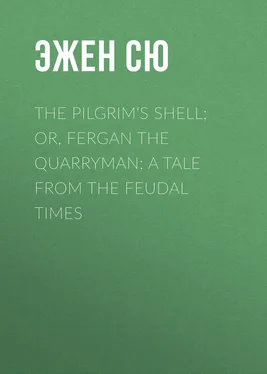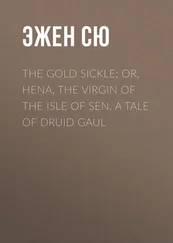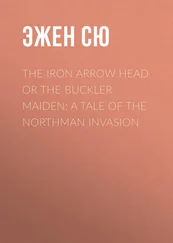Эжен Сю - The Pilgrim's Shell; Or, Fergan the Quarryman - A Tale from the Feudal Times
Здесь есть возможность читать онлайн «Эжен Сю - The Pilgrim's Shell; Or, Fergan the Quarryman - A Tale from the Feudal Times» — ознакомительный отрывок электронной книги совершенно бесплатно, а после прочтения отрывка купить полную версию. В некоторых случаях можно слушать аудио, скачать через торрент в формате fb2 и присутствует краткое содержание. Издательство: Иностранный паблик, Жанр: literature_19, foreign_antique, foreign_prose, на английском языке. Описание произведения, (предисловие) а так же отзывы посетителей доступны на портале библиотеки ЛибКат.
- Название:The Pilgrim's Shell; Or, Fergan the Quarryman: A Tale from the Feudal Times
- Автор:
- Издательство:Иностранный паблик
- Жанр:
- Год:неизвестен
- ISBN:нет данных
- Рейтинг книги:3 / 5. Голосов: 1
-
Избранное:Добавить в избранное
- Отзывы:
-
Ваша оценка:
- 60
- 1
- 2
- 3
- 4
- 5
The Pilgrim's Shell; Or, Fergan the Quarryman: A Tale from the Feudal Times: краткое содержание, описание и аннотация
Предлагаем к чтению аннотацию, описание, краткое содержание или предисловие (зависит от того, что написал сам автор книги «The Pilgrim's Shell; Or, Fergan the Quarryman: A Tale from the Feudal Times»). Если вы не нашли необходимую информацию о книге — напишите в комментариях, мы постараемся отыскать её.
The Pilgrim's Shell; Or, Fergan the Quarryman: A Tale from the Feudal Times — читать онлайн ознакомительный отрывок
Ниже представлен текст книги, разбитый по страницам. Система сохранения места последней прочитанной страницы, позволяет с удобством читать онлайн бесплатно книгу «The Pilgrim's Shell; Or, Fergan the Quarryman: A Tale from the Feudal Times», без необходимости каждый раз заново искать на чём Вы остановились. Поставьте закладку, и сможете в любой момент перейти на страницу, на которой закончили чтение.
Интервал:
Закладка:
"I am at your mercy," answered the prelate; "the will of God be done. Do with me as you will."
"I shall avail myself of your leave," replied the seigneur of Plouernel. "Oh, this is a happy day to me!"
"I ask only one favor," rejoined the bishop, "the favor of keeping near me this poor monk until the moment of my death, that he may help me to die like a Christian."
"I do not mean to send you quite so soon to Paradise. I have other designs upon you," and beckoning to Garin the Serf-eater to draw near, the seigneur of Plouernel whispered a few words in his ear. The bailiff nodded affirmatively, crossed the drawbridge and entered the donjon.
During their father's brief dialogue with the bishop, Guy and Gonthram had not ceased to pursue Isoline with their lascivious looks, and the frightened young girl had hidden her face on the breast of her father. Robin the Nantesian, raising his voice, said to Neroweg, while placing his hand on the shoulder of the townsman: "This is one of the richest merchants of the city of Nantes. He is called Bezenecq the Rich. Forget not that he is worth his weight in gold."
The Count fastened his falcon eyes upon the captive, and, taking two steps toward him, said: "Your name is Bezenecq the Rich?"
"I am so called, noble seigneur," humbly answered the bourgeois. "If your men have arrested me in order to make me pay ransom, I only request not to be separated from my daughter. Hand me a parchment. I shall write to the depositary of my money to deliver a hundred gold sous to whomever of your men shall deliver my letter to him. You will have the sum upon the return of your messenger, and you will then return our liberty to myself and my daughter." Seeing that the Count shrugged his shoulders with a sardonic smile, the merchant added: "Illustrious seigneur, instead of one hundred gold sous I will give you two hundred. But, I pray you, for mercy's sake, have me taken with my daughter to some apartment where the poor child may recover from her fright and the fatigues of the journey." Isoline, more and more alarmed at the ardent looks of the two whelps, trembled convulsively. Neroweg, silent as before, looked from time to time towards the donjon as if awaiting the return of the bailiff. Bezenecq resumed with an effort: "Seigneur, if two hundred pieces of gold do not yet suffice you, I shall go as far as three hundred. It means my ruin. But I resign myself to that, provided you set my daughter and myself free."
At that moment Garin the Serf-eater came out of the donjon, recrossed the draw bridge and spoke in an undertone to Neroweg, who, turning to the prisoners, said: "Come along, my guests! You will learn what I am to do with you. You are to have a chat with a certain dame of great powers of persuasion."
"Oh, you butcher! You mean to put me to the torture!" cried the bishop, horror stricken. "Jesus, my God, have pity upon me! Mercy! Mercy!"
"No weakness, Simon," whispered Jeronimo to him; "we must submit to the will of God. His ways are inscrutable."
"Let the bishop be taken to his lodging; the monk shall keep him company." The bishop emitted lamentable cries and essayed to resist the men who were dragging him into the donjon. "It is now your turn to step in, Bezenecq the Rich. Come, brother, resistance is useless."
"Have I not offered you three hundred gold sous for my ransom, Count of Plouernel?" asked the merchant. "If you do not find that sum enough I shall add another hundred gold pieces. I shall have given you my whole fortune!"
"Oh, worthy brother, in honor to the commerce of Nantes, I cannot admit that one of its wealthiest merchants is worth only four hundred gold sous!" Then, turning to his men: "Conduct my guest and his daughter to their quarters."
At the moment when the men of Neroweg were about to take hold of Bezenecq the Rich, Gonthram, brutally seizing the hand of Isoline, whom the merchant held fainting in his embrace, said: "I take this girl! She is my share of the ransom!"
"I also want her," cried out Guy, his eyes all aflame and advancing toward his brother with a menacing look. But Gonthram, little caring for the words and threats of his brother, made ready to seize the maid and carry her off. Guy then drew his sword. Gonthram in turn drew his, while the daughter of the townsman, distracted with terror, shrank within herself, inert, in a swoon.
"Guy! Gonthram! Put up your swords! This maid shall be none of yours," ordered Neroweg. "She shall not leave her father. In the presence of his daughter the bourgeois will prove more accommodating. Put back your swords! You, Garin," he went on, turning to the bailiff, "take this beauty in your arms, if she cannot walk, and carry her in with the old man."
Isoline, catching, despite her terror, the last words of Neroweg, rose to her feet with an effort and said to Garin in a suppliant voice: "For mercy's sake, my good seigneur, take me along with my father. I shall have strength to walk."
"Come," answered the bailiff, leading her to the draw bridge, while Guy and Gonthram, slowly returning their swords to their scabbards, exchanged such vindictive looks that the Count considered it necessary to remain near them in order to prevent a fresh outbreak.
Isoline, following Garin with unsteady step, crossed the draw bridge and entered the hall of the stone table, where still several vassals of the seigneur awaited the close of the session that had been interrupted by the arrival of the prisoners. At one of the corners of this hall was the stone staircase that led down in a spiral from the platform of the donjon to its lowest cells. Near the steps was a trap door. Two men of sinister figure, clad in goat skins and carrying lanterns in their hands, stood near the gaping opening. Bezenecq was loudly calling for his daughter, and resisting with all his force the men who were dragging him in. Seeing, however, his daughter advancing towards him, he ceased to offer resistance, but broke down, weeping.
"Hurry up, my rich townsman!" said Garin the Serf-eater to him; "my seigneur wishes that you and your daughter remain together." Then, turning to the gaolers who carried the lanterns: "Go down first and light our way." The gaolers obeyed, and soon the merchant and Isoline disappeared with them in the depths of the subterranean donjon.
CHAPTER VII.
ABBOT AND MONK
The donjon cells of the manor of Plouernel consisted of three vaulted stories, the only daylight into which penetrated through three narrow slits opening upon the gigantic ditch, out of which rose the donjon itself. Within, apart from a massive door studded with iron, these cells consisted of stone only – they were roofed with stone, floored with stone, and the walls were of stone, ten feet thick. The cell, whither the Bishop of Nantes and the monk Jeronimo were taken, was at the very bottom of this subterraneous structure. A narrow loophole barely filtered through a pale ray of light into that semi-Stygian darkness. The walls sweated a greenish moisture. In the center of the dungeon stood a stone bed, intended for torture or death. Chains and heavy iron rings fastened to the headpiece, to the sides and the feet of the long stone slab, that rose three feet above the floor, announced the purpose of that funereal couch, on which were now seated the monk and the Bishop of Nantes. The latter, a prey at first to agonizing despair, had by degrees recovered his composure. His face, now almost serene with a melancholic good nature, contrasted with the somber severity of his companion. "I am now resigned to death," the prelate was saying to Jeronimo, "yet I confess, I feel my heart fail me at the thought of leaving my wife and children without protection in days as dark as these are."
"There you have one of the consequences of the marriage of priests," the monk answered. "How justly did Gregory VII. reason when he forced the councils to interdict marriage to the clergy!"
Читать дальшеИнтервал:
Закладка:
Похожие книги на «The Pilgrim's Shell; Or, Fergan the Quarryman: A Tale from the Feudal Times»
Представляем Вашему вниманию похожие книги на «The Pilgrim's Shell; Or, Fergan the Quarryman: A Tale from the Feudal Times» списком для выбора. Мы отобрали схожую по названию и смыслу литературу в надежде предоставить читателям больше вариантов отыскать новые, интересные, ещё непрочитанные произведения.
Обсуждение, отзывы о книге «The Pilgrim's Shell; Or, Fergan the Quarryman: A Tale from the Feudal Times» и просто собственные мнения читателей. Оставьте ваши комментарии, напишите, что Вы думаете о произведении, его смысле или главных героях. Укажите что конкретно понравилось, а что нет, и почему Вы так считаете.












